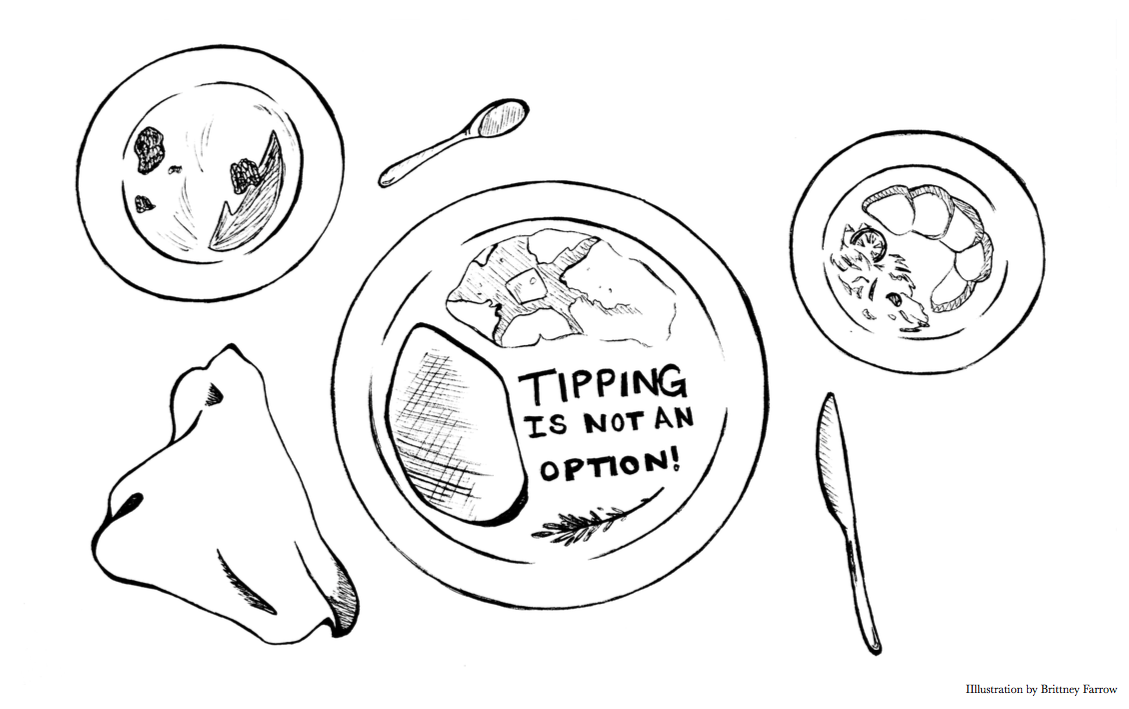How bad tips contribute to the dehumanization of food service workers
By: BRITTNEY FARROW
Opinions Editor
With a chef dad and a server mom, my family is a food family. Having parents with careers in the food service industry, my whole life has revolved around
dining.
While other families spent their time and vacation funds on theme parks and gift shops, my family spent their money on black truffles and glazed duck. At only eight years old, I had already dined in my fair share of four and five-star restaurants, and my favorite dish — much to my chef father’s dismay — was lobster. I grew up in bars, grills and restaurants.
 I learned how to wordlessly tell a server I was done with my meal (fork and knife lined up in the center of the plate with the handle resting on the rim); I learned which utensils to use for each course. Most importantly I learned how to tip my server, and that good service should always be rewarded generously but bad service should never be severely penalized.
I learned how to wordlessly tell a server I was done with my meal (fork and knife lined up in the center of the plate with the handle resting on the rim); I learned which utensils to use for each course. Most importantly I learned how to tip my server, and that good service should always be rewarded generously but bad service should never be severely penalized.
My mother made a living on tips and I realized very quickly that for many people their livelihood depended on the appropriate etiquette of customers like myself.
I have had many part-time jobs, but none have suited me quite as well as working as a server.
When I first started at a popular chain restaurant I started off hosting — which is compensated by an hourly wage — and then transitioned into a much more hands-on and frantic position which depends mostly on tips.
I made good money hosting; however, being a waiter or waitress gives one the opportunity to make really, really great money. Unfortunately, that also means I can make nothing. Whether or not I make enough to pay my bills does have some relation to the level of service I provide, but I’ve noticed something highly disturbing: it also does not.
Waiting tables is exhausting. It is a very physical job weighed down by mental stress. Many nights I come home covered in chicken & gnocchi soup and stinking of garlic. My feet ache, my fingers get blistered; I burn myself over and over again.
At the end of the day I fall into bed — way too tired to do anything but sleep — and no matter how much rest I get it is never enough.
Do not get me wrong: I know I chose this life. I know that I took these minor inconveniences in exchange for the chance to make a decent living. That does not always make it easy; it does not excuse the way I am sometimes treated.
Being a server and relying on tips to get by means that I am at the mercy of my guests. Cranky old men, overwhelmed and snooty soccer moms — it does not matter. At the end of a meal, every guest is the same. I have to tolerate being talked down to and scolded for things beyond my control — things that include changes to the menu, the speed of the kitchen staff and the amount of garlic salt dusted on a breadstick. Things that I have no part in.
When I try my best to please a table and end up with only loose change it is hard not to feel more than a bit worthless and defeated.
When older men give me attention that I do not want, I am forced to grin and bear it to make the money I deserve. One time I was even verbally attacked in a brutal ambush stemming from a mother and daughter tag-team, and even though my manager was at fault I could not say so. It would not have mattered anyway.
My point is, tipping your server should never be seen as an optional component of dining. Unless your server is horribly offensive (and no, that does not include being less smiley than you would like) a diner needs to pay at least fifteen percent.
If the experience is truly awful, a general manager or any other manager is always available to listen to complaints, and those complaints will always reach the waiter or waitress.
A person’s livelihood should never suffer over minor inconveniences. If fifteen percent is too steep for a tip, then perhaps eating out is not a valid option. Fast food or food shops do not require tips, and can be just as delicious.
Even cutting a few cents out to make an even number as the total bill price is really not acceptable. It does not make you a decent person, even if you only stiff your waiter a few coins. Sure, it may sound like a greedy way of life but it is also a difficult way of life.
I, as a server, would never spit in someone’s food, but I am only one cog is a system of many parts. When the decency a guest displays could be the difference between a waiter or waitress feeding their children, some will not show the same restraint that I do. Tip well, not because you need to but because you should.
The people who eat out at restaurants and do not tip appropriately are no different than the people who throw their empty popcorn bags and candy boxes on the floor of movie theaters and say it is someone else’s job to clean it up. Yes, that may technically be true, but it only further proves that so many people look at food service workers as beneath them.
McDonald’s workers recently requested $15 an hour and were met with scrutiny and ridicule. Whether or not fast food workers deserve so much money is not the point. The point is that for some reason that I cannot fathom most people think that they are not required to treat people in the food industry with respect.
If someone hired a plumber and did not pay them they would face extreme consequences; if someone requested the assistance of a brain surgeon to improve their health and did not pay the bill they would be harrassed with telephone calls until they found the money.
Why is it so difficult to believe that I, along with those I work with in the same industry, want to be regarded with half of the same respect?
I am not asking for more money than I deserve. I know when I give someone poor service; I feel extremely guilty when my guests walk away feeling cheated out of a lovely evening. Still, servers work hard. We deserve more than pennies.












